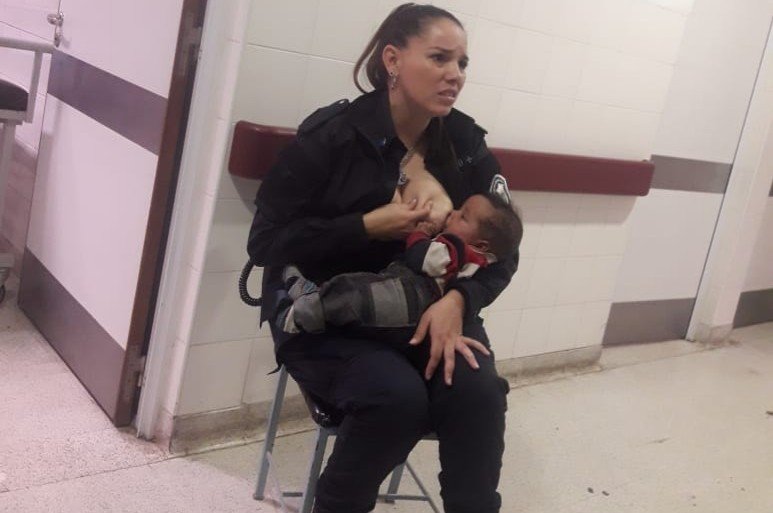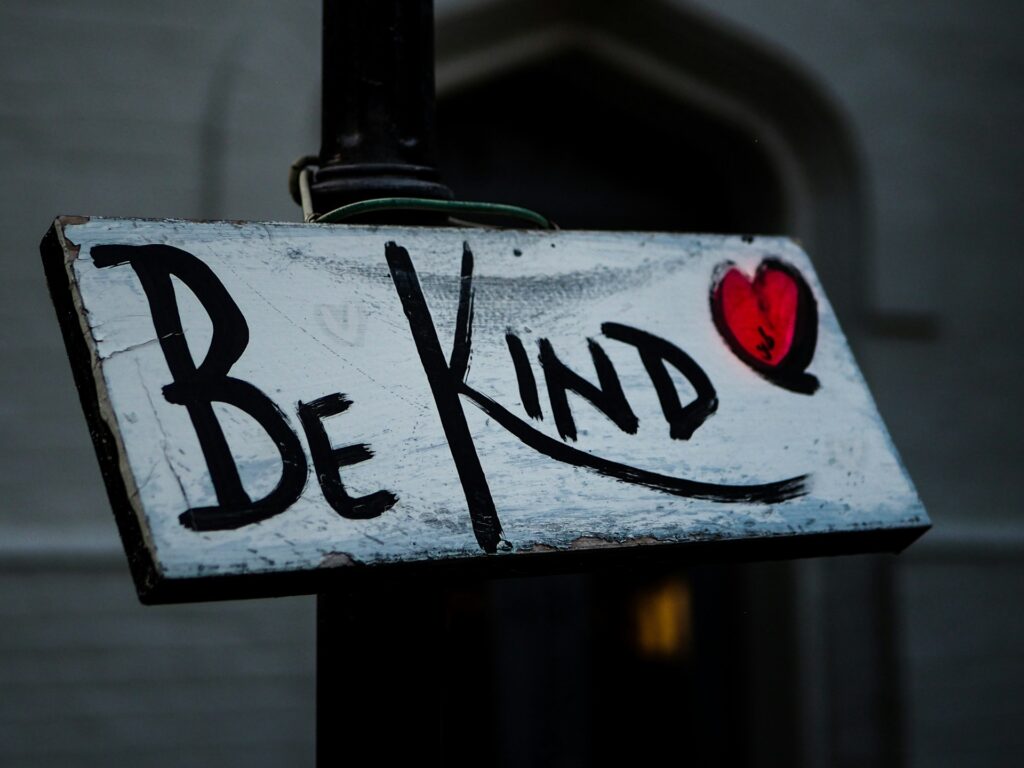The Compassion That Redefined Duty: Celeste Ayala’s Story

In Buenos Aires, a police officer named Celeste Ayala changed the world’s view of compassion in an instant. While on duty at a children’s hospital, she heard the heartbreaking cries of a malnourished infant brought in under protective custody. Medical staff were overwhelmed, and the child’s distress filled the room. Without hesitation, Ayala asked permission to hold the baby, cradling the tiny life in her arms. When she learned there was no formula available, she instinctively began to breastfeed the child, offering nourishment, comfort, and care in the purest form.
According to The Guardian, the infant had been rescued from deeply troubling living conditions. The moment was simple yet profound, a human response born from empathy rather than procedure. That single act would soon transcend borders, inspiring millions.
Her act resonated so deeply because it defied societal expectations of uniformed officers. Many saw it as a turning point that reminded the world that compassion is not limited by profession or circumstance. It demonstrated that being human always precedes being a title.
The child, comforted and calm, symbolized the healing power of empathy. In that quiet hospital room, Ayala’s actions echoed the universal need for care and tenderness in a world often dominated by rules and indifference.

A Picture That Captured the World’s Heart
The act was quietly captured by fellow officer Marcos Heredia, who later shared the image on Facebook. Within hours, the photograph spread worldwide. It showed Ayala, in uniform, holding the baby against her chest, her face calm and tender. The sight of an officer responding not with authority but with compassion was enough to silence cynicism and invite reflection.
CNN reported that the viral post garnered thousands of comments, with people around the globe praising her for embodying the true meaning of public service. The image reminded many that compassion still exists in places of duty and discipline, and that strength can take the form of tenderness.
The photograph also ignited discussions on the power of imagery in social change. A single photo became a global statement, carrying more emotion than any press release could. It transcended culture, religion, and politics, uniting people under a shared admiration for kindness.
It served as a reminder that even in a digital age overwhelmed by negativity, moments of goodness still have the power to stop the world in its tracks and make people believe again in human connection.
A police officer breastfed a 'malnourished and dirty' baby that was brought into a hosp. where she was on guard duty.
— 🅶🅰🅱🆈(◍•ᴗ•◍) 🩹❤️🩹🫂🇦🇷 (@gabrieluchis_81) August 19, 2018
#CelesteAyala was working at the Sor Maria Ludovica children's hospital in Buenos Aires, Argentina when the baby was brought in crying desperately. #LivePD pic.twitter.com/2YtmgXvNB2
Recognition Beyond Borders
The photo not only touched hearts but also inspired recognition. As CBS News recounted, the Buenos Aires police department soon promoted Ayala from officer to sergeant, honoring her extraordinary compassion. Officials praised her as a model of service that reflected courage beyond regulations.
During the ceremony, Ayala expressed humility and gratitude. She explained that she never imagined her gesture would draw such attention; she simply acted on maternal instinct. Her words resonated deeply with people everywhere who saw in her a symbol of humanity unbound by titles or uniforms.
Her promotion became more than an acknowledgment of a single act, it became a message to the world that institutions can and should celebrate compassion. It signaled a cultural shift toward valuing emotional intelligence in public service.
The recognition also encouraged conversations about how empathy can be incorporated into training systems for first responders, ensuring that future officers balance strength with sensitivity.
Lessons From the Heart of a Mother
Psychologists and child welfare experts praised Ayala’s instinctive response, noting that human touch and care are vital for infants suffering from neglect. The nourishment she provided went beyond physical sustenance; it was emotional rescue. Studies show that the warmth of human contact can stabilize a child’s stress levels and foster trust even in crisis.
Her act also reignited global discussions about the intersection of motherhood and professional life. Women from all walks of life identified with Ayala’s story, the challenge of balancing compassion with responsibility, the strength it takes to act from the heart in demanding roles.
Many mothers expressed that Ayala’s act was more than kindness; it was representation. It showed that motherhood is not confined to biology but extends to the universal instinct to nurture and protect.
It also challenged workplace stereotypes, proving that compassion in professional environments should not be seen as weakness but as a transformative strength capable of changing lives.

Compassion in Uniform: A Rare Strength
The story sparked an important conversation about the human side of law enforcement. Officers often face immense pressure to remain detached and composed, yet Ayala showed that empathy and professionalism can coexist. Her decision to step beyond routine showed that sometimes, following your heart is the truest form of duty.
In interviews following the event, her colleagues described her as “the soul of the station,” someone who treats everyone with dignity. That reputation now had a global stage. Her story demonstrated that uniformed service does not strip away humanity, it magnifies it when guided by compassion.
Public figures and leaders also highlighted her example as a reminder that emotional courage is as essential as physical bravery. Her act became a beacon of moral leadership that transcended the badge.
Communities began advocating for empathy-based policing models inspired by her story, encouraging officers worldwide to find a balance between enforcement and care.
Ascendieron a la oficial de la Bonaerense que amamantó al bebé del Hospital de Niños https://t.co/MYyx50bw0e #CelesteAyala @CristianRitondo @SeguridadProv pic.twitter.com/cQfJaHrIAi
— ANDigital (@ANDigitalOK) August 17, 2018
Global Ripple: The Message That Traveled Far
From Argentina to Europe and across social platforms, Ayala’s act became a global conversation about kindness. It inspired fundraisers for orphaned children, motivated social campaigns promoting empathy, and was even featured in leadership programs as an example of moral courage.
Her image served as a reminder that no act of compassion is too small to make an impact. People began sharing their own stories of kindness under the same post, turning what started as a single act into a collective movement of empathy.
Schools, NGOs, and humanitarian organizations cited Ayala’s story in workshops as an example of social empathy in action. It became a teaching tool for the power of individual choices.
Through it all, Ayala remained humble, reminding the world that the truest acts of kindness are never done for recognition, they are simply done because it is the right thing to do.
When a malnourished, crying baby came into the hospital where Officer Celeste Ayala was on guard duty, she offered a helping hand. pic.twitter.com/LBugRHeaIl
— HuffPost (@HuffPost) August 20, 2018
A Lasting Reminder for Humanity
At its core, Ayala’s gesture is not just about a moment; it’s about what we choose to do when confronted with another’s pain. Would we look away, or would we step forward like she did? Her courage to care reminds us that authority and empathy can live side by side.
Her story continues to inspire conversations about what it truly means to serve and protect. It reminds us that compassion can move faster than any command and can bridge divides that laws alone cannot mend.
Her image continues to circulate as a symbol of hope, a reminder that goodness can be found in unexpected places. It challenges us to nurture our own capacity for compassion in everyday life.
In a divided world, her story calls for unity through empathy, urging us to see that kindness is the most universal language we possess.

The Quiet Power of Kindness
Ayala’s journey challenges us to find compassion in our own daily routines. Whether it’s helping a stranger, offering comfort, or standing up for someone in distress, these acts of humanity shape a kinder world. Her story invites us to believe that kindness still matters, and that it always will.
Her selfless action in that hospital was more than a response to hunger; it was a statement that care transcends boundaries. It proved that even in uniform, the most powerful badge we can wear is empathy.
It also serves as a call to action for every reader, to choose understanding over judgment, to replace apathy with compassion, and to recognize that small acts of kindness can create lasting ripples.
Ultimately, Celeste Ayala’s story is a timeless reminder that the power to change the world often lies in the simplest gestures of humanity.
Featured Image Credit: Courtesy Of @WomenintheWorld | Twitter (X)
Loading...

